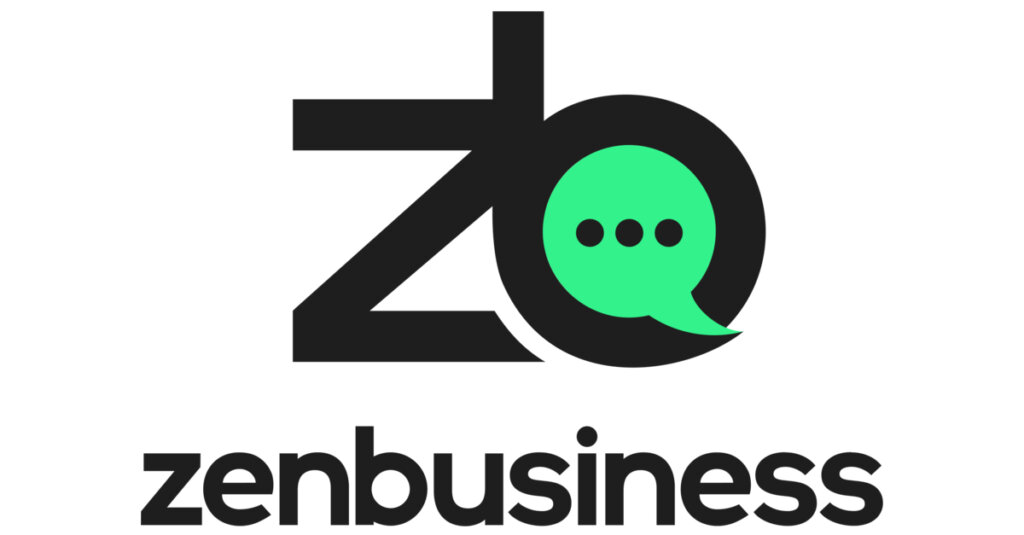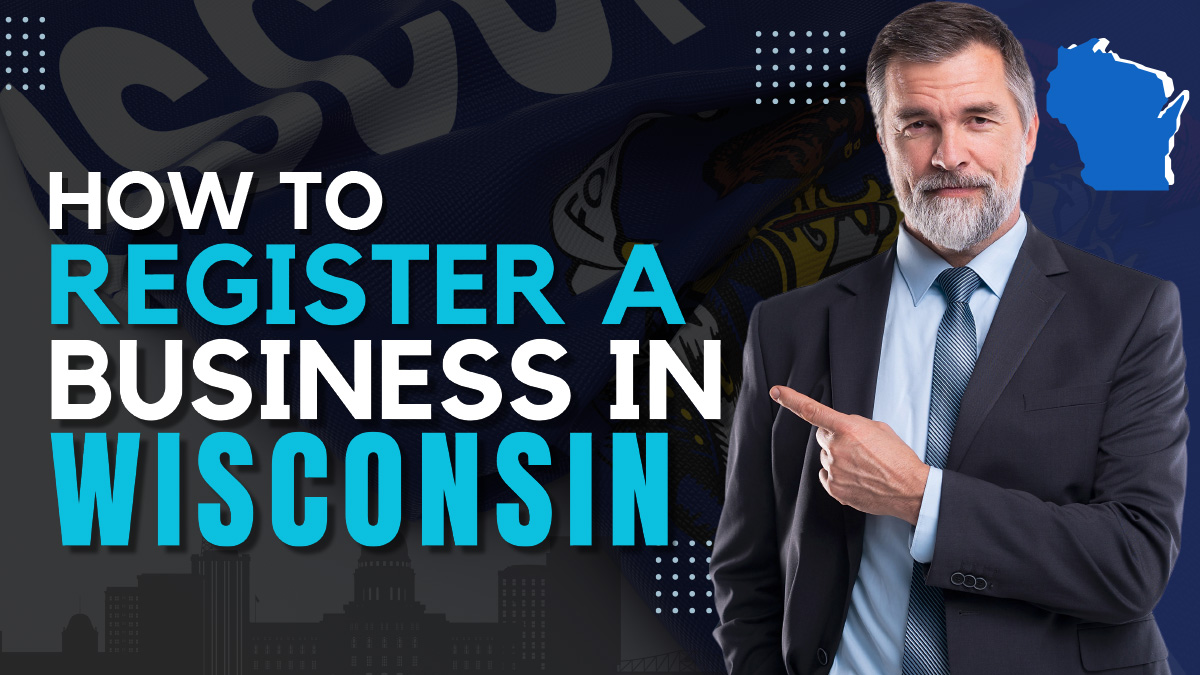Registering a new business can bring about emotions, including excitement and a sense of fulfillment. However, for those new to the world of entrepreneurship, registering a business can seem overwhelming due to its complexities. Thankfully, with the right guidance and access to resources, registering your business in Wisconsin doesn’t have to be complicated.
In this blog post, we provide you with a detailed step-by-step guide to simplify Wisconsin’s business registration process. We will offer valuable tips and resources to make the entire process smoother. Whether you’re venturing into a new business or looking to register an existing one, this guide will take you through each stage of the registration process in seven easy-to-understand steps.
Even with the guidance given, there may still be difficulties when registering a business. We’ve compiled a comprehensive list of top-notch services for business registration in Wisconsin, like ZenBusiness, to make the process easier for you. So let’s dive into the specifics and help you register your business in Wisconsin smoothly.
>> Wisconsin Business Registration – ZenBusiness >>
How to Register Your Business in Wisconsin in 7 Simple Steps
Mastering the protocols is key to successfully registering a business in Wisconsin. Utilize this extensive guide consisting of seven essential steps to register a business in Wisconsin in a polished and proficient manner within Wisconsin.
Step 1: Choose Your Business Structure
When contemplating the suitable organizational framework for your business in Wisconsin, evaluating the nature of your enterprise and its growth strategies is crucial. Let’s delve into a more detailed examination of the various alternatives, encompassing incorporated and unincorporated options.
Please be aware that registering your business with the Wisconsin Secretary of State is only obligatory if you opt for a structure that necessitates incorporation. Here are several possibilities to consider:
Sole Proprietorship
In Wisconsin, a sole proprietorship is the most basic form of business organization. In this structure, the owner and the business are seen as one entity in legal terms. The owner bears personal liability for any debts or obligations incurred by the business. Setting up a sole proprietorship is relatively simple, involving minimal legal and administrative responsibilities. While state registration isn’t obligatory, obtaining local licenses or permits may be necessary.
General Partnership
A general partnership refers to a business jointly owned by two or more individuals. In this type of partnership, the owners share profits and losses. Each partner in a general partnership has personal liability for the debts and legal responsibilities of the business. Registering a general partnership with the state of Wisconsin isn’t mandatory. Still, you may have to submit a “Wisconsin Assumed Name Certificate” (DBA) in the county where your business operates.
Limited Partnership (LP)
In Wisconsin, a limited partnership is formed by one or more general partners who oversee the operations and take on unrestricted personal responsibility, along with one or more limited partners who contribute capital but bear restricted liability. To create an LP in Wisconsin, you must submit a “Certificate of Limited Partnership” to the Wisconsin Secretary of State.
Limited Liability Company (LLC)
An LLC is a versatile business formation that merges the legal protection of a corporation with the tax advantages and ease of a partnership. In Wisconsin, establishing an LLC necessitates submitting Articles of Organization to the Wisconsin Secretary of State and developing an Operating Agreement to outline the management and ownership framework of the company.
Corporation
In the state of Wisconsin, there exist two distinct forms of corporations, each operating as a distinct legal entity with limited liability protection for its shareholders.
- C-corporations
- S-corporations
To form a company in Wisconsin, submit the Articles of Incorporation to the Wisconsin Secretary of State. The specific requirements may vary depending on the type of business you have. Corporations typically involve additional formalities, including drafting bylaws, issuing shares, and conducting regular meetings with the board of directors and shareholders.
When choosing the most suitable business structure for your needs, consider factors such as liability protection, taxation implications, and management requirements. If you need guidance in making this decision, it’s recommended that you seek advice from a legal or business expert.
>> Wisconsin Business Registration – ZenBusiness >>
Step 2: Select a Unique Business Name
In Wisconsin, multiple methods exist to consider when naming your business. These options include registering a legal entity name, obtaining a trademark, or registering a legal name and operating under a different name.
It’s important to note that regulations and guidelines for naming businesses vary from state to state, so it’s crucial to research and understand the specific requirements in Wisconsin.
Similar to incorporating your business, the naming process you choose in Wisconsin will depend on the unique needs and circumstances of your entity. You have the choice of pursuing all three avenues for maximum protection of your chosen name or selecting one option that best suits your situation. While not mandatory, it’s recommended to use the same name across all registration methods.
Now let’s inspect each naming option available in Wisconsin:
Legal Entity Name
Businesses in Wisconsin are required to register a legal entity name, which is used by the state as the official identification for the company. The entity name must be unique to prevent any other business from having the same name as yours.
Wisconsin’s naming regulations include rules regarding company suffixes (such as LLC, LP, or Corp) and mandate that the chosen name accurately represents the type of business being registered. To check if a particular name is available, you can use the official database provided by the Wisconsin Department of Financial Institutions.
Trademark
Trademark registration in Wisconsin provides businesses with intellectual property protection for their names or logos on a national level. To ensure the uniqueness of a desired name or logo, conducting a thorough search in the USPTO database is essential to avoid any existing registrations.
Once successfully registered, the trademark offers nationwide protection against others using similar names or logos for similar goods or services. However, it’s crucial to understand that having a trademark doesn’t grant unlimited usage rights for the name or logo in all situations.
Doing Business As (DBA)
In Wisconsin, entrepreneurs can register their business in Wisconsin using one official name and operate it under a different name, which is commonly known as a Doing Business As (DBA) name.
To establish a DBA, individuals must submit a Registration of Firm Name (DBA) with the Wisconsin Department of Financial Institutions. While these names are protected by federal trademark laws, a DBA doesn’t need to be exclusive at the state level.
By fully grasping and considering these naming possibilities, you can effectively register your business name in Wisconsin and protect your brand’s identity.
>> Wisconsin Business Registration – ZenBusiness >>
Step 3: Consider Taxes and Other Costs in Wisconsin
Wisconsin LLCs might have to pay various taxes.
- Franchise Tax: Wisconsin LLCs are subject to a flat tax based on their net worth. The tax rate is $25 per every $1,000 of net worth, with a maximum cap of $100,000.
- Income Tax: If a Wisconsin LLC is classified as a corporation for federal tax purposes, it’s also liable for Wisconsin income tax at a rate of 7.9%.
- Sales and Use Tax: Wisconsin LLCs engaged in selling goods or services within the state must collect and remit sales and use tax, set at a rate of 5.5%.
- Withholding Tax: When Wisconsin LLCs withhold income from their employees, they must remit withholding tax to the state. This tax comprises a 6.2% rate for Social Security and a 1.45% rate for Medicare.
- Property Tax: Wisconsin LLCs that possess real property in the state are subject to property tax, which is calculated based on the property’s assessed value.
Wisconsin LLCs may encounter various taxes apart from the ones mentioned earlier, such as excise and environmental taxes. The specific taxation an LLC faces depends on its business nature and activities.
To simplify registration in Wisconsin, entrepreneurs can use online services like ZenBusiness. This platform offers a wide range of professional solutions to streamline the registration process. These solutions include quick filing with the Secretary of State, acquiring an Employer Identification Number (EIN), and creating an operating agreement.
ZenBusiness provides continuous compliance support to help businesses comply with state regulations consistently. By offering comprehensive help, ZenBusiness ensures businesses maintain their adherence to regulations.
>> Register Your Business With ZenBusiness >>
Step 4: Register and Acquire Licenses and Permits in Wisconsin
To meet the legal obligations, submit applications for licenses and permits pertaining to your business activities. Below are the vital procedures that must be adhered to:
Tax Registration: In order to sell merchandise in Wisconsin, complete the registration process with the Department of Revenue (DOR) for collecting sales taxes. If your company will hire employees, you must register with the DOR for employer withholding taxes as well.
The registration can be done online through either the state’s One Stop Business Portal or the DOR’s Online Registration site, depending on your specific business category.
Alternatively, you can register via paper by filling out Form BTR-101, which is known as Application for Wisconsin Business Tax Registration.
EIN (Employer Identification Number): If your company employs individuals or is subject to independent taxation, acquire a federal Employer Identification Number (EIN) from the IRS. Even if an EIN isn’t legally obligatory, it can provide many benefits for business operations.
Many banks demand an EIN to establish an account under the company’s name, and other business associates may request an EIN for payment processing purposes. The process of obtaining an EIN can be completed online with no charge for filing fees.
Regulatory Licenses and Permits: Various areas are covered by licenses and permits, such as health and safety, environmental concerns, building, and construction. Different agencies issue these licenses and permits.
When it comes to tax-related licenses, the Department of Revenue is the go-to for information and applications. The Department of Natural Resources and divisions within the Department of Health Services take care of other crucial regulatory licenses and permits.
To discover the licenses and permits for your business, refer to the websites of the cities or counties where your operations will be based.
Professional and Occupational Licenses: Individuals in various fields are governed by these licenses. The Wisconsin Department of Safety and Professional Services (DSPS) provides extensive details about the licensed professions and occupations in the state.
By diligently following these steps, you can guarantee that your business complies with legal requirements and operates seamlessly within the relevant regulatory framework.
>> Register Your Business With ZenBusiness >>
Step 5: Open a Bank Account for Your Business in Wisconsin
Once you have obtained your EIN, the next important step is to begin opening a business bank account in Wisconsin.
The laws governing Limited Liability Partnerships (LLPs), Limited Liability Companies (LLCs), and corporations require establishing a separate business bank account. Sole proprietors and unincorporated partnerships aren’t legally required to maintain distinct personal and business bank accounts.
To open a business account in Wisconsin, visit a local bank and complete all necessary paperwork. You should thoroughly evaluate different financial institutions before making your final decision, comparing their rates and benefits.
Even if you’re operating as a sole proprietor or unincorporated partnership in Wisconsin, it’s wise to maintain a dedicated company bank account to ensure a clear separation between personal and business finances. This proactive approach will be beneficial if you decide to incorporate your business in the future.
Step 6: Protect Your Intellectual Property in Wisconsin
When registering a business in Wisconsin, it’s of utmost importance to prioritize the safeguarding of your valuable intellectual property (IP). Depending on your company, you may possess assets such as trademarks, copyrights, or patents that require protection.
For instance, businesses often seek to prevent unauthorized use of their name, logo, or designs. Depending on your business’s focus area, you may also want to secure rights for product designs or creative works like writing, designs or music that you produce.
To accomplish this objective effectively in Wisconsin, there are several options for IP protection. It’s recommended to initiate the applications to avoid any unauthorized exploitation of your IP.
Trademark
In the state of Wisconsin, a trademark is defined as a distinctive symbol, phrase, word, or design that sets apart a product or service from similar options available in the market.
To secure legal protection for their trademarks, individuals and businesses must go through the formal registration process at the United States Patent and Trademark Office (USPTO). This process usually takes around four to six months to complete. Once registered, the trademark is safeguarded across the entire country, giving owners the right to take legal action against any unauthorized use.
For businesses operating in Wisconsin, register their trademarks with USPTO. Doing so not only helps preserve their brand identity and reputation but also provides them with legal recourse in case of any unauthorized usage of their trademark.
Copyright
Wisconsin acknowledges the importance of safeguarding original works of authorship, such as literature, drama, music, art, and various other intellectual creations. This encompasses a wide range of mediums including written content, software programs, web materials, movies, audio recordings, images and other forms of creative expression.
In Wisconsin, once you create a new piece of work you automatically receive copyright protection as the creator. As the owner with exclusive rights to distribute, reproduce or sell your intellectual property and create derivative works based on it; you have legal authority over its usage.
It’s advisable to register your copyright with the U.S Copyright Office for additional legal protection and evidence of ownership. By registering your copyright in Wisconsin you take measures to protect against infringement and establish means to enforce your rights through legal proceedings if necessary.
Patent
Securing a patent is of utmost importance if you have developed a new product or machinery in Wisconsin. A patent provides the holder with exclusive rights, preventing anyone else from manufacturing, selling, or importing the patented item for a specified period.
Obtaining a patent is complex and can take up to five years to complete. To safeguard your unique invention, it’s essential to start early. Patent applications must be submitted to the United States Patent and Trademark Office (USPTO).
By prioritizing the protection of your intellectual property in Wisconsin, you can ensure that your brand, products, and creations are preserved. This will give you a competitive advantage and foster continued growth for your business.
Step 7: Set Up Your Payment Infrastructure in Wisconsin
To ensure that your business in Wisconsin can promptly serve customers upon registration, establish a payment acceptance system that’s efficient and hassle-free.
There are several options for payment processing services that offer interfaces that are easy to use and seamlessly integrate with your website or point-of-sale (POS) system. Prominent choices include Square, Stripe, and PayPal. These systems are flexible and can be easily customized to align with the goals of your business.
These payment processors allow you to accept various forms of payment, such as credit and debit cards, ACH transfers, digital wallets like Apple Pay and Google Pay, among others. By opting for a trustworthy payment processing service, you empower your customers to use their preferred methods of payment through a secure platform. This ensures a smooth transaction experience for both you and your clients.
When choosing a payment processor, it’s crucial to ensure that you’re also compliant with sales tax regulations in Wisconsin. This means obtaining a Wisconsin Sales and Use Tax Permit from the Wisconsin Department of Revenue, which gives you the authority to collect sales tax on taxable products and services.
Once your payment system is set up, your business based in Wisconsin will be ready to effectively and securely serve customers, ultimately leading to increased revenue. By diligently following these guidelines, you can establish a legally sound business in the state of Wisconsin.
>> Register Your Business in Wisconsin With ZenBusiness >>
Top 5 Business Registration Services for Wisconsin Entrepreneurs
Entrepreneurs and small business owners in Wisconsin have access to a range of professional services that can assist with business registration. These services provide comprehensive solutions, aiding in registering a business in Wisconsin and ensuring compliance with state and federal regulations. Below are some of the top options for entrepreneurs registering their businesses in Wisconsin.
ZenBusiness

ZenBusiness is a well-known online service for registering businesses. They focus on business formation, registered agent services, and filing annual reports.
ZenBusiness offers reasonable pricing options and provides personalized help along with various resources to help businesses stay compliant and achieve growth. Their website is easy to navigate, and their streamlined procedures make it effortless to register a business in Wisconsin.
>> Register Your Business in Wisconsin With ZenBusiness >>
Swyft Filings

Swyft Filings is a renowned service provider for business registration Wisconsin, specializing in streamlined and uncomplicated business formation services such as LLC formation, incorporation, and compliance. Through personalized help and invaluable resources, Swyft Filings simplifies registering a business in Wisconsin while ensuring adherence to state and federal regulations.
Entrepreneurs in Wisconsin benefit from Swyft Filings’ user-friendly website and affordable pricing options as they easily register their businesses.
>> Register Your Business in Wisconsin With Swyft Filings >>
Tailor Brands

Tailor Brands is a digital platform that specializes in helping businesses establish a consistent and polished brand image. Their services include logo design, business card creation, and social media branding.
Tailor Brands equips businesses with various design tools and assets to personalize their brand identity. While not specifically focused on traditional business registration in Wisconsin, Tailor Brands aids Wisconsin-based enterprises in projecting an air of professionalism to appeal to potential customers.
>> Register Your Business in Wisconsin With Tailor Brands >>
Northwest Registered Agent

Northwest Registered Agent is a well-known online service that assists businesses with their registration needs, including registered agent services, compliance management, and document filing.
With a strong reputation for providing exceptional customer service and high-quality assistance, Northwest Registered Agent offers personalized support to ensure businesses comply with state and federal regulations. Their extensive range of services includes business formation options for LLCs, corporations, and nonprofits, specifically in the state of Wisconsin.
>> Wisconsin Business Registration – Northwest Registered Agent >>
Incfile

Incfile is an online service known for its expertise in facilitating business registration in Wisconsin. Their services include affordable and prompt business formation packages, registered agent support, compliance management, and document filing.
With a user-friendly interface designed to streamline registering a business in Wisconsin, Incfile aims to make the experience hassle-free. They offer ongoing help and valuable resources to help businesses comply with regulations and achieve growth.
Entrepreneurs based in Wisconsin can take advantage of these comprehensive business registration services by carefully evaluating their individual requirements. By conducting thorough research and comparing these services, entrepreneurs can ensure a smooth and productive registration process for their ventures.
>> Register Your Business in Wisconsin With Incfile >>
Business Registration Laws in Wisconsin
In Wisconsin, multiple steps and criteria are involved in registering a business. Here’s a general outline of the laws governing business registration in Wisconsin.
- Choose a Business Structure: Choose the appropriate legal framework for your company, such as a sole proprietorship, partnership, Limited Liability Company (LLC), or corporation. Each structure carries distinct legal and tax consequences.
- Business Name Registration: If you intend to run your business using a name different from your legal name, it will be necessary for you to register a trade name, which is commonly referred to as a “Doing Business As” (DBA) name. The trade name registration can be completed through the Wisconsin Department of Financial Institutions.
- Obtain an Employer Identification Number (EIN): To comply with tax regulations, most companies must acquire an EIN from the IRS. This special identifier is essential for businesses intending to have employees or function as a corporation or partnership.
- Register with the Wisconsin Department of Revenue: If you plan on selling goods or services that are subject to taxes or if you intend to hire employees, obtain a Wisconsin Tax Identification Number from the Wisconsin Department of Revenue. This unique number is required for state tax-related matters.
- Obtain Necessary Permits and Licenses: By your enterprise, you might be required to acquire supplementary permits or licenses on a local, state, or federal level. The particular prerequisites differ depending on the type and location of your business. For advice regarding licenses and permits, consult either the Wisconsin Department of Agriculture, Trade, and Consumer Protection or the Wisconsin Small Business Development Center.
- Register with the Wisconsin Department of Financial Institutions: To register a business in Wisconsin as a legal entity, file the required paperwork with the Wisconsin Department of Financial Institutions if you intend to operate as an LLC, corporation, limited partnership, or Limited Liability Partnership. This crucial step ensures that your business is officially recognized within the state.
- Compliance with Employment Laws: If you intend to employ individuals, adhere to federal and state employment regulations. This entails confirming the eligibility of employees to work in the United States, deducting taxes, and abiding by workplace safety guidelines.
Please be aware that the requirements for business registration Wisconsin may change as time goes on. It’s therefore recommended to refer to the Wisconsin Secretary of State’s official website or consult with a legal professional to ensure that you comply with the latest regulations.
>> Register Your Business in Wisconsin With ZenBusiness >>
Alternative Business Registration Methods in Wisconsin
Wisconsin offers various alternative business registration methods, aside from the conventional process. These alternatives prove helpful for specific businesses or individuals. Below are a couple of alternative methods to register a business in Wisconsin:
Online Registration
The Wisconsin Department of Financial Institutions (DFI) provides a convenient online registration solution known as the Wisconsin One Stop Business Portal. Through this portal, you can easily register your business in Wisconsin, complete essential forms, and acquire the licenses and permits.
Mail-In Registration
If you favor a registration process that involves paper, you have the option to acquire the required forms from the DFI website or by directly reaching out to their office. The forms can be completed by you and sent via mail along with the corresponding fees to the DFI.
Phone Registration
The DFI offers an alternative method for registering specific businesses, which involves using a phone. To begin the registration process through this option, you can reach out to the Business Services Section of the DFI. They will assist you in completing all necessary steps and guide submitting the required documents and paying any applicable fees.
Professional Assistance
If you’re looking for another option, you could consider getting help from a lawyer or a company that specializes in business formation. These experts can guide you through the registration process, make sure you follow all the state rules, and take care of the paperwork for you.
It’s worth mentioning that even though these alternative methods can make registering your business easier, there may still be certain criteria to meet and licenses or permits to obtain depending on your type of business. To get the most accurate and current information for your unique situation, it would be wise to consult with an attorney or reach out directly to the Wisconsin DFI.
Benefits of Registering Your Business in Wisconsin
When you choose to register your business in Wisconsin, you open the door to many advantages that can enhance its growth and prosperity. Let’s explore some benefits associated with registering your business in Wisconsin:
- Legal recognition: When you register your business with the state of Wisconsin, it grants official acknowledgment, and establishes your business as its own distinct legal entity. This offers a safeguard for your assets by separating them from any liabilities associated with the business, ultimately decreasing your financial exposure.
- Limited liability protection: In Wisconsin, establishing either a Limited Liability Company (LLC) or a corporation grants you the benefit of limited liability protection. This means that if your business encounters legal problems or debts, your personal assets are typically safeguarded and cannot be seized to settle any business obligations.
- Professional reputation: By registering your business, you showcase professionalism and credibility to customers, suppliers, and partners. This not only adds legitimacy to your business but also has the potential to enhance trust among stakeholders.
- Access to funding: By registering your business in Wisconsin, you can improve your chances of obtaining funding from banks, investors, or government programs. Registered businesses are often favored by lenders and investors because it provides them with a higher level of assurance and trust.
- Perpetual existence: After completing the registration process, your company will have an everlasting presence. This implies that it can continue functioning even when ownership or management changes occur. Such stability and reassurance are crucial for long-term planning and ensuring business continuity.
- Tax advantages: Wisconsin provides a range of tax advantages and perks for enterprises, such as tax credits, deductions, and exemptions. These incentives can potentially lower your overall tax obligations and boost your profitability.
- Government contracts and resources: By registering your business in Wisconsin, you can unlock the potential to compete for government contracts and use government resources. Registered businesses receive valuable help, support, and access to resources from the state, which aids in navigating regulatory obligations and uncovering avenues for growth.
- Access to resources and networking: When officially registering your business in Wisconsin, you open doors to various local business resources, chambers of commerce, industry associations, and networking events. These connections offer crucial advice, assistance, and potential collaborations that can contribute to the success of your business.
- Brand protection: In Wisconsin, it’s essential to register your business name and trademark to protect your brand identity and prevent others from using a similar name or logo. This safeguard ensures you can establish and nurture brand recognition with no potential confusion arising in the market.
- Employee recruitment and retention: Registering your business can increase the attractiveness to potential employees. It shows stability and professionalism, appealing to talented individuals seeking long-term career opportunities.
It’s crucial to emphasize that although enrolling your company in Wisconsin provides various advantages, it’s advisable to seek advice from a competent lawyer or business consultant to grasp the distinct legal and financial consequences of your particular circumstances.
Is Business Registration Required in Wisconsin? Find Out Here
In Wisconsin, businesses must go through the process of registering with the state. The specific requirements for registration may differ depending on various factors, such as the type of business entity, the nature of the business, and other relevant considerations.
Typical registration procedures include obtaining a permit for Wisconsin Sales and Use Tax, registering a Limited Liability Company (LLC) or Corporation in Wisconsin, as well as acquiring any necessary professional licenses or permits specific to certain industries.
To ensure that you’re fully compliant with all registration obligations and to avoid potential legal and financial repercussions, it’s crucial to research and understand the specific requirements that apply to your particular business.
>> Get Started With ZenBusiness >>
How to Register Your Business in Wisconsin – Frequently Asked Questions
What Do I Need to Register a Business in Wisconsin?
To register a business in Wisconsin, select a suitable name for your venture, determine the most appropriate legal structure, and meticulously complete all necessary documentation for submission to the Wisconsin Secretary of State.
The specific requirements may vary depending on your business. However, they typically include filing Articles of Organization, appointing a registered agent, and obtaining any relevant licenses or permits.
How Much Does It Cost to Register a Company in Wisconsin?
The cost of registering a business in Wisconsin can vary based on the legal structure chosen and the specific filing requirements. If you opt for an LLC, you will need to pay $130 for filing the Articles of Organization, while a corporation requires a fee of $100. It’s important to note that additional charges for extra filings and permits may be related to your specific business activities.
Can a Foreigner Register a Business in Wisconsin?
Foreign individuals can engage in entrepreneurship in Wisconsin, as long as they fulfill the legal requirements. To do so, prospective foreign business owners must obtain the proper visas or work permits and comply with the registration criteria set forth by state and federal authorities.
Do I Need to Register My Online Business in Wisconsin?
When running an online business in Wisconsin, it’s crucial to evaluate whether registering your business with the state is necessary. The need for registration may vary depending on your online operations. While sole proprietorships and partnerships might not require registration, corporations and LLCs typically do.
In addition, obtaining specific permits and licenses may be required. For example, you might need a seller’s permit from the Wisconsin Department of Revenue.
To ensure compliance with relevant regulations, it’s highly advisable to seek professional help from an attorney or accountant with expertise in Wisconsin’s business laws. They can guide you through the registration process and help you understand any additional legal obligations to your online venture.
>> Register Your Business in Wisconsin With ZenBusiness >>
Bottom Line on How to Register Your Business in Wisconsin
To ensure adherence to state laws and regulations, register your business in Wisconsin. By diligently adhering to the prescribed procedures and meeting specific requirements, you can establish a firm foundation for your venture.
Begin by carefully choosing a business name and legal structure that aligns with the guidelines set by the Wisconsin Secretary of State. Complete all necessary documentation and obtain any licenses or permits required for your industry and location. Simplify this process and guarantee comprehensive compliance by utilizing the services of a reputable business registration Wisconsin provider like ZenBusiness.
By investing time and effort into properly registering your business in Wisconsin, you can proactively address potential legal and financial complications while positioning yourself for sustainable growth and success.
>> Get Started With ZenBusiness >>
Related Articles
Learn How To Register a Business by State
Explore our interactive U.S. map to cultivate your knowledge on registering a business by exploring the unique processes and requirements specific to each state.

 Sections of this topic
Sections of this topic
















